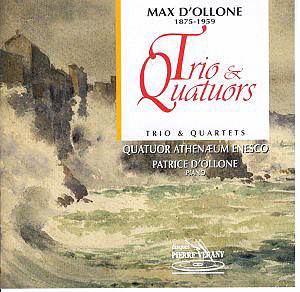This disc is something of a revelation – three substantial
works by a French composer who has been largely neglected for more than
fifty years. Formal in structure, and highly representative of the late
romantic era, they possess a freshness, intensity and individuality
that deserves a better fate.
d’Ollone, a pupil of Massenet at the Paris Conservatoire,
won the Prix de Rome in 1897, and later became conductor and
director of the Concerts Populaire in Angers and the American
Conservatoire in Fontainbleau, a professor at the Paris Conservatoire
and Director of Music Teaching at the Opéra Comique. His
output includes many operas, five of which were produced in Paris during
the inter-war years, a ballet, de Temps abandonné, symphonic
and chamber works, and almost seventy songs.
The String Quartet was written in 1899, the Trio in
1920 and the Piano Quartet in 1949. Broadly speaking all three are "Brahmsian"
in inspiration, though with a decidedly French accent, and can therefore
be considered examples of d’Ollone’s early, mid and late chamber music.
There is little if anything to identify them with the impressionism
of contemporaries such as Debussy and Ravel, though their chromaticism
is reminiscent of César Franck. However, facile comparisons aside,
this is music there to be savoured for what it is rather than what it
might resemble.
The Trio, which is in cyclic form, shows complete assurance
in the organisation of its thematic material, from the predominantly
easygoing first and second movements to a turbulent Scherzo and
a fast, finale. The composer’s attention to "logical" development
is typically French, but does not prevent him from creating an adventurous
rhythmic and harmonic structure, occasionally nearing, but never overstepping,
the boundaries of tonality. Themes develop naturally within a transparently
contrapuntal texture, and in all three works on this disc one gets the
feeling that d’Ollone is constantly aware of how his ideas are evolving.
The Piano Quartet, in which the composer’s grandson,
Patrice, is the pianist, is persuasive and unquestionably "Brahmsian"
in character, particularly in the muscular dotted rhythms of the finale;
yet it consistently finds something original to say, and says it with
subtlety, vigour and rich melodic invention. The string playing is highly
accomplished (as it is throughout this recording) and Patrice d’Ollone
is a powerful advocate of his ancestor’s music.
The Quartet, the most obviously romantic work on this
disc, was composed during the composer’s stay in Rome, and possesses
all the natural charm of his mentors, Massenet and Saint-Saëns;
yet again d’Ollone has own personal way of dealing with such pervasive
influences. This is a satisfying and far-from-immature work, and I impatiently
await further opportunities for becoming acquainted with other works
by this fascinating composer.
Roy Brewer
See also
review by Rob Barnett


